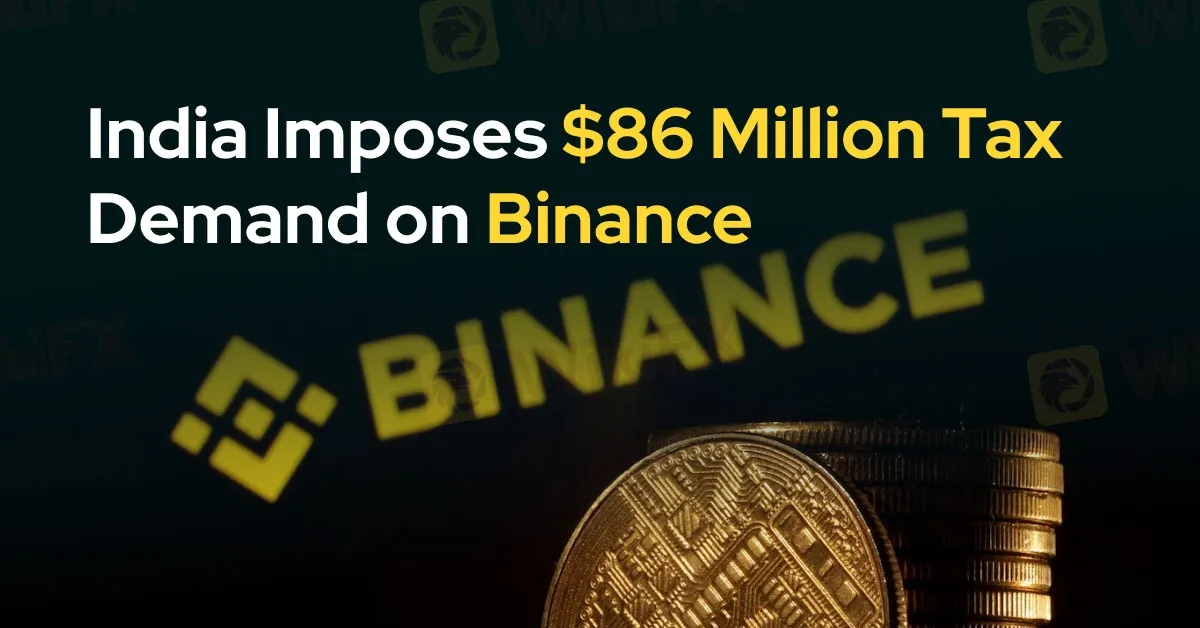简体中文
繁體中文
English
Pусский
日本語
ภาษาไทย
Tiếng Việt
Bahasa Indonesia
Español
हिन्दी
Filippiiniläinen
Français
Deutsch
Português
Türkçe
한국어
العربية
India Imposes $86 Million Tax Demand on Binance
Abstract:The Indian government is asserting its regulatory authority in the cryptocurrency sector, issuing a substantial $86 million tax demand to Binance.

The Indian government is asserting its regulatory authority in the cryptocurrency sector, issuing a substantial $86 million tax demand to Binance, the worlds leading cryptocurrency exchange. This action follows the earlier ban on Binance and other offshore exchanges in 2024 for non-compliance with Indian regulations.
In April, Binance expressed its intention to re-enter the Indian market, but this goal has encountered significant challenges. On August 6, the Directorate General of Goods and Service Tax Intelligence (DGGI) served a tax notice to Binance under the Goods and Services Tax (GST) laws. Indian authorities allege that Binance collected at least $48 million in transaction fees from Indian users, with these funds purportedly deposited in an account associated with a Seychelles-based Binance affiliate.

This tax demand marks a pivotal moment as the first instance of the Indian government targeting a cryptocurrency exchange. Initial efforts to communicate with Binance offices abroad were unsuccessful, leading to the engagement of Indian legal counsel to address the tax dispute.
The Indian governments action underscores its increased focus on regulating offshore crypto exchanges operating outside the GST framework, which imposes tax rates ranging from 5% to 28% on transactions, with additional fees for specific services.
Binances previous success in the Indian market may be partly attributed to its alleged non-compliance with local tax laws, which require a 1% tax deducted at source (TDS) on all crypto transactions. Indian regulations also mandate that crypto service providers and investors deduct a 1% TDS and levy a 30% tax on crypto investment profits. While domestic exchanges such as WazirX and CoinDCX comply with these tax requirements, many offshore exchanges have not.
Initially, Binance proposed a $2 million settlement to resolve its non-compliance and regain access to the Indian market. However, the current $86 million tax demand aims to recover the transaction fees accumulated from Indian users during Binances prior operations.
Notably, this tax demand appears to be specifically directed at Binance. Other foreign crypto exchanges, including Huobi, Kraken, and several others, have not yet received similar tax notices from Indian authorities. This situation raises questions about the future regulatory landscape for offshore crypto exchanges in India and the potential for further government actions.
This development highlights Indias intent to enforce stringent regulatory measures on the cryptocurrency market, ensuring compliance with local tax laws and protecting the integrity of its financial system. As the country continues to refine its approach to cryptocurrency regulation, the actions taken against Binance may set a precedent for how other offshore exchanges will be treated in the future.

Disclaimer:
The views in this article only represent the author's personal views, and do not constitute investment advice on this platform. This platform does not guarantee the accuracy, completeness and timeliness of the information in the article, and will not be liable for any loss caused by the use of or reliance on the information in the article.
Read more

EU MiCA Update: 10 Authorized Stablecoin Issuers & 11 CASP Providers
Under MiCA, 10 firms have been authorized to issue e-money tokens (EMTs), commonly known as fiat-backed stablecoins. These issuers have launched a total of 15 EMTs, consisting of 10 euro-denominated tokens and 5 US dollar-denominated tokens.

Google Bitcoin Integration: A Game-Changer or Risky Move?
Google Bitcoin integration blends wallets with Google accounts, stirring security fears and adoption hopes. ZKP encryption aims for privacy.

Pi Network Mainnet Launch: Game-Changer or Crypto Controversy?
Pi Network’s Mainnet launch sparks debate. With 100M users, KYC compliance, and Binance listing rumors, will it redefine crypto accessibility?

Coinbase Urges US Lawmakers to Establish Clear Crypto Regulations
Coinbase calls for clear US crypto regulations to foster innovation, protect consumers, and ensure transparency in the digital asset industry.
WikiFX Broker
Latest News
Pi Network Mainnet Launch: Game-Changer or Crypto Controversy?
GlobTFX Users Report Same Issue! But Why?
Rate Cut or Not? It Depends on Trump’s Policies
Why Do You Keep Blowing Accounts or Making Losses?
eToro Adds ADX Stocks to Platform for Global Investors
B2BROKER Launches PrimeXM XCore Support for Brokers
Germany's Election: Immigration, Economy & Political Tensions Take Centre Stage
WikiFX Review: Is IVY Markets Reliable?
WikiFX Community Creator Growth Camp
Effect of Tariffs on Gold and Oil Prices
Currency Calculator






